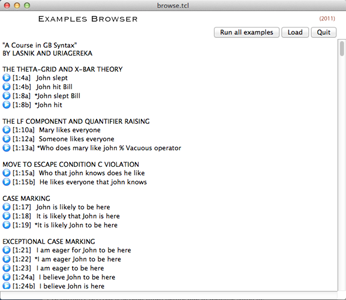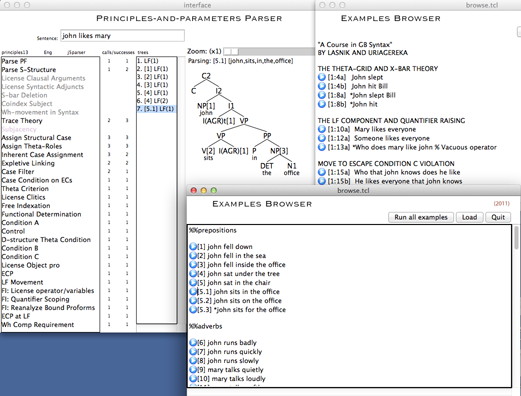


|

|
To send a single example to the main display, simply click on the play button  to the left.
to the left.
(Bug: currently you must do "load defaults" first, otherwise the
newpappi process will hang.)
The "Run all examples" button will send all examples found in the browser window to the main display.
It is possible to create your own set of example sentences.
The "Load" button will allow you to select any
.xpl file.
(See the Appendix below for the .xpl file format details.)
It is also possible to have multiple browsers simultaneously open.

Each browser is an independent process and communicates with the
parser via port 9992.
Simply run the supplied browse.tcl under the
Wish interpreter. For example:
wish browse.tcl sentences.xplin a terminal window starts up a sentence browser on file
sentences.xpl.
browse.tcl and the
.xpl are in the same directory.)
Alternatively:
wish browse.tclstarts up an empty sentence browser.
Use the "Load" button to select a .xpl file.
(Quirk: currently you must start the Lasnik & Uriagereka examples first before starting any other sentence browsers. This is because Prolog needs to fork a child process to listen for browser input in additional to the main GUI. Starting the Lasnik & Uriagereka examples sets this up. You should not quit the Lasnik & Uriagereka sentence browser when you use a secondary sentence browser.)
l&u.xpl.
/Applications/newpappi.app/Contents/Resources folder.)
You can create your own examples file using a text editor. The "Load" button in the browser will permit the loading of any file with the .xpl extension.
By convention, a play button  will be placed at the
start of any line beginning with [...].
will be placed at the
start of any line beginning with [...].
The example sentence is taken to be the text after [...] up to the end of the line or the comment character (%). Each sentence must be on a separate line. Simple preprocessing will be applied to the extracted text.
Note: the current preprocessor (written in tcl) will perform the following:
?*!# 's and 't, trailing
' -> 'sJohn -> john(over)
here -> here:.;,anata$you ->
anata plus the feature eng(you)[2:34a] *John[i] thinks John[i]
likes Mary, both occurrences of John will
receive the feature index(I) such that I
is the same value.interface2.tcl.
Lines not beginning with [...] are considered to contain no examples.
For example, l&u.xpl looks like this:
"A Course in GB Syntax" BY LASNIK AND URIAGEREKA THE THETA-GRID AND X-BAR THEORY [1:4a] John slept [1:4b] John hit Bill [1:8a] *John slept Bill [1:8b] *John hit THE LF COMPONENT AND QUANTIFIER RAISING [1:10a] Mary likes everyone [1:12a] Someone likes everyone [1:13a] *Who does mary like john % Vacuous operator